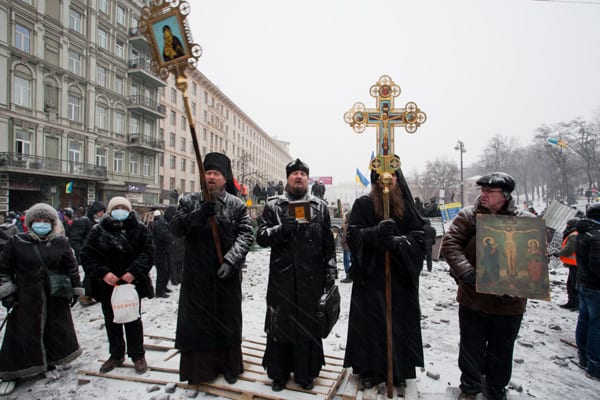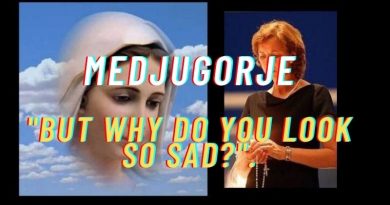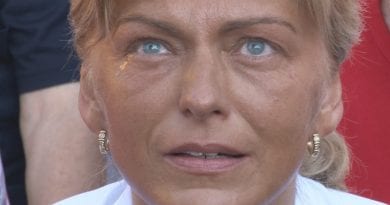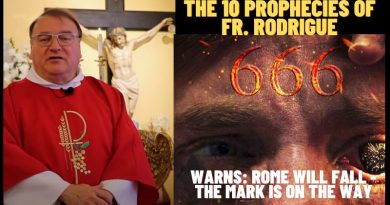Signs / Prophecy: Crisis between the Russia and the Ukranian Orthodox Church – A Really BIG Deal – “Putin is using language that we haven’t heard from political leaders in centuries — literally in centuries! The State is now ready to go to war over the Church.”
Dr. Steve Turley is a swiftly rising YouTube sensation, author of multiple books, blog writer and education specialist. He makes a compelling argument about the imminent worldwide return to traditional values in terms of culture, politics and religion. Check out his fascinating blog and YT channel!
Published Originally on Russia- Faith
TRANSCRIPT:
Alright there, everyone, Russian president Vladimir Putin is vowing to defend Russian Orthodox churches and monasteries in war-torn Ukraine, a political rhetoric we have not heard in centuries, and what it means for our current global context. That is what we’ll be talking about on today’s video.
You know, as an Orthodox Christian, this really is one of the saddest stories I’ve had to report on in all the issues and all the events that we’ve covered together over the last two years. I don’t know how many of you are aware of what’s going on in Eastern Orthodox Church, but it really is quite distressing, and, indeed, it’s becoming rather dangerous in many respects. I read a number of commentaries on the whole situation of late, but what I find most fascinating in these commentaries is how they seem to have actually overlooked what is perhaps the single most important development going on right now, as we speak, in the midst of all of this. And I will get to that in a moment.
Let me give you some background of what’s going on here between Russia and the Ukraine in terms of the Orthodox Church. I’m sure many of you remember what is considered, more or less, the start of the whole Ukrainian Civil War, which was the gun fight that erupted between police and anti-government protesters in Maidan Square in Central Kiev. This is back, now, in 2014. In fact, the protesters accused the government of opening fire on them and shooting indiscriminately. Whatever was the case, whatever happened, dozens of people were, tragically, killed. This prompted, of course, this mass backlash among the citizens of Ukraine, which then, in turn, caused the then-president Viktor Yanukovych to flee the country. In the midst of this basically anarchistic chaos, Russia entered Crimea and Southeastern Ukraine, and the stated purpose was to defend its own national security interests as well as to defend Russians from hostilities in Eastern Ukraine. And we all know that Russia went on to complete the reunification of Crimea through a subsequent referendum.
Basically, just in case you don’t know, Eastern Ukraine tends to be very pro-Russia, and upwards of 75% of the population speaks Russian, while Western Ukraine is very, very nationalistic, very anti-Russia, very pro-European. Very few people speak Russian in Western Ukraine. I think it’s only about 5% or so. And so, in the midst of this Crimean issue, pro-Russian Ukrainians in Eastern Ukraine drew a military response from Kiev and Western Ukraine. And so . . . Western Ukraine began cracking down on pro-Russian forces in Eastern Ukraine. Hence, you have a full-blown civil war.
Now, in the process, a fellow by the name of Petro Poroshenko wins a new presidential election. And as part of his pro-European, anti-Russian agenda, he actively begins the process of separating the Ukrainian Orthodox Church from its traditional jurisdiction, which has, for centuries, been under the Moscow Patriarchate. I think it’s since the 16th [or] 17th century, the Ukrainian Church has been, in effect, and extension of the Russian Orthodox Church, governmentally. But now, more or less in response to Crimea, Poroshenko and the Ukrainian government decided to pursue autonomy from the Russian Orthodox Church, which, of course, is vehemently opposed by the Moscow Patriarch, who rightly points out that not all in the Ukrainian Orthodox Church want autonomy. Also, Ukraine is home to thousands of Russian Churches and hundreds of Russian monasteries that are predicated on the centuries-old jurisdictional relationship.
But then, in just the last couple of weeks, representatives from that portion of the Ukrainian Orthodox Church that wants to separate from Moscow, convinced the [Ecumenical] Patriarch Bartholomew, [who], as I understand it, if you can believe it, was actually taking advice on this issue from former Vice President Joe Biden. Okay, of all people, Joe Biden! They convinced the Patriarch – who was once the Patriarch of Constantinople, the center of the Byzantine world, now, of course Istanbul. They convinced the Patriarch to grant autonomy to the Ukrainian Church, which he did, and which, of course, infuriated Moscow. And as a result, as a response, as a protest to this very controversial decision on the part of Patriarch Bartholomew, the Moscow Patriarch, Kyrill, has excommunicated [Patriarch Bartholomew] from any ties with the Russian Orthodox Church.
The Russian Orthodox Church is now officially asserting itself as the Third Rome, as they have been calling themselves over the last centuries. The geographic and spiritual center of the Church was once considered to be Rome proper, right, in Italy. Then it moved to Constantinople. And then after 1453, when Constantinople was overtaken by the Muslims, the new center of Orthodox Christianity, the New Rome, as it were, became Moscow. So the Russian Church has excommunicated the Patriarch of Constantinople, as it were, and are asserting themselves to be the center of Eastern Orthodox identity now.
Now, as I mentioned, not everyone in the Ukrainian Orthodox Church is going along with this effort at what’s called “autocephaly,” an autonomous Ukrainian Orthodox Church. Many want to stay under the Moscow Patriarch. And so, the next step in all of this is for Ukraine to unite its various separatist churches and pro-Russian churches into a single, independent Ukrainian Church, which would require Russian Orthodox parishes within the Ukraine to break ties with the Russian Orthodox Church and become part of the new Church jurisdiction. And, of course, this would involve, at least potentially, taking over about 12,000 churches and 200+ monasteries that belong to the Russian Orthodox Church. And this is where Vladimir Putin now comes in.
President Putin has issued a statement, through one of his official spokesmen, that he will absolutely defend the interests of Russians and Russian speakers and will absolutely defend the interests of the Russian Orthodox Church in the Ukraine. And he stated that he is, in fact, committed to protecting and defending the Russian Orthodox from any of the illegal or hostile activity perpetrated within them from within the borders of Ukraine.
Now, what’s making everyone so nervous here is that this is precisely the kind of rhetoric that Putin used in regard to Crimea. You have to remember that Russians see Ukraine as an intrinsic part of Russia. Prince Vladimir, the one who brought Christianity to Russia — he was baptized in the Ukraine, in Crimea, in fact. So, this has obviously turned into a very, very tense situation.
So, what sense should we make of it all? Well, I think the single most important takeaway from all of this for us who are analyzing where we are on the world stage today in terms of our history, the single most important takeaway is that Vladimir Putin, in declaring that he’s going to defend and protect the Church, the Russian Orthodox Church, Putin is using language that we haven’t heard from political leaders in centuries — literally in centuries! The State is now ready to go to war over the Church. You have to let that hit you. The State is now ready to go into war over the Church! Folks, this is what is the most important takeaway in all of this.
Putin’s rhetoric exemplifies that we are, in fact, entering into what we call here on this channel a post-secular world order. Scholars are doing a lot of research on this right now, especially in terms of international relations. International relations are notoriously secular in their frames of reference, being modern. Religion is simply irrelevant to the modern, globalist, international order and its conception of things.
In a secular age, it’s absolutely unthinkable that a state would ever go to war over the Church or any other religious institution for that matter. You know, it’s something that backwards Middle Eastern nations do, or something like that. That’s all changing as we speak! As we talk about all the time in this channel, renewed nationalist sentiments involve what’s called “retraditionalization dynamics,” which reaffirm the religions, and customs, and traditions of a nation that foster a unique national and religious cultural identity. So, while a secular society couldn’t care less about religion, a post-secular society is, indeed, willing to defend their religion. I think we’re seeing that here with Vladimir Putin’s comments.
An important caveat here, to keep us honest here: I think it’s important to qualify this with another conclusion scholars have reached, which is that it’s a complete and total myth to say that religions actually cause war, that religions are inordinately prone to provoking war. That’s a modern secular myth that religions cause war. Scholars such as William Kavanaugh have demonstrated that to be completely false. So, we don’t want to interpret what’s going on between Russia and Ukraine in that light. It’s better, I think, to interpret it this way: While it’s a myth to say that religions cause war, nevertheless, in a post-secular society, nations WILL go to war over their religions. While it’s not the case that religions CAUSE war, post-secular societies will GO to war over their religions. That’s a very important distinction, I think, we need to make here.
So, Putin’s rhetoric is a clear indicator that we are, indeed, entering into a post-secular, and indeed post-globalist world order.
In the meantime, we’ll certainly be keeping our eyes on this very tragic situation, praying for a peaceful resolution with respect to both the Church and the State in the coming months ahead.
Transcription provided by Dormition Professional Services.






